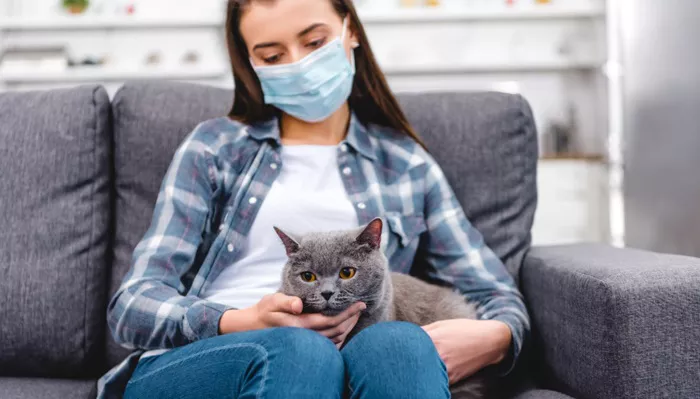Cat allergies are a common issue, affecting millions of individuals worldwide. These allergies can trigger a range of symptoms, including sneezing, itchy eyes, and persistent coughing. For cat lovers, managing these symptoms can be particularly challenging. This article provides a detailed guide on how to stop coughing from cat allergies, offering practical advice and strategies to help alleviate symptoms and improve quality of life.
Understanding Cat Allergies
Before delving into how to stop coughing from cat allergies, it’s essential to understand what causes these allergies. Cat allergies are primarily caused by proteins found in a cat’s skin cells (dander), urine, and saliva. When a person with a cat allergy comes into contact with these proteins, their immune system mistakenly identifies them as harmful substances, triggering an allergic reaction.
Symptoms of Cat Allergies
Common symptoms of cat allergies include:
1. Sneezing
2. Runny or stuffy nose
3. Itchy, watery eyes
4. Red, itchy skin
5. Coughing
6. Wheezing
7. Shortness of breath
Among these symptoms, coughing can be particularly troublesome and disruptive. It’s often a result of the body’s attempt to clear the allergens from the respiratory system.
Preventive Measures to Reduce Cat Allergens
The first step in managing cat allergies and reducing coughing is minimizing exposure to allergens. Here are some preventive measures:
1. Keep Your Home Clean
Regular cleaning can significantly reduce the amount of cat dander in your home. This includes:
Vacuuming: Use a vacuum cleaner with a HEPA filter to capture dander and other allergens.
Dusting: Dust surfaces with a damp cloth to prevent allergens from becoming airborne.
Washing Bedding: Frequently wash bedding, curtains, and other fabrics that can trap dander.
2. Create Cat-Free Zones
Designate certain areas of your home as cat-free zones, particularly bedrooms. This can provide a safe space where you can escape from allergens and reduce the overall exposure.
3. Use Air Purifiers
Air purifiers with HEPA filters can help remove airborne allergens, including cat dander. Place them in frequently used rooms to improve air quality.
4. Regular Grooming
Regularly grooming your cat can help reduce the amount of dander. Brushing your cat outdoors or in a well-ventilated area can prevent dander from spreading inside your home. Additionally, consider bathing your cat periodically using a cat-friendly shampoo to reduce allergens.
5. Wash Hands and Change Clothes
After interacting with your cat, wash your hands thoroughly and change your clothes to remove any dander that may have settled on you.
Medical Treatments for Cat Allergies
In addition to preventive measures, medical treatments can help manage the symptoms of cat allergies, including coughing. Here are some options:
1. Antihistamines
Antihistamines are commonly used to relieve allergy symptoms. They work by blocking histamine, a chemical released during an allergic reaction. Over-the-counter options include loratadine (Claritin), cetirizine (Zyrtec), and fexofenadine (Allegra). Prescription options are also available and may be recommended by a healthcare provider.
2. Decongestants
Decongestants can help reduce nasal congestion and ease breathing. They are available in oral forms, such as pseudoephedrine (Sudafed), or nasal sprays like oxymetazoline (Afrin). However, nasal sprays should not be used for more than a few days to avoid rebound congestion.
3. Nasal Corticosteroids
Nasal corticosteroid sprays, such as fluticasone (Flonase) and mometasone (Nasonex), can reduce inflammation and alleviate nasal symptoms. These sprays are often more effective than antihistamines for treating chronic allergy symptoms.
4. Allergy Shots (Immunotherapy)
Allergy shots, or immunotherapy, involve regular injections of small amounts of allergens over several years. This can help desensitize the immune system and reduce the severity of allergic reactions. Allergy shots are typically recommended for individuals with severe allergies who do not respond well to other treatments.
5. Leukotriene Inhibitors
Leukotriene inhibitors, such as montelukast (Singulair), can help manage allergy symptoms, particularly those affecting the respiratory system. These medications block the action of leukotrienes, chemicals that contribute to allergic reactions and inflammation.
6. Asthma Medications
If cat allergies trigger asthma symptoms, such as coughing and wheezing, asthma medications may be necessary. These can include inhaled corticosteroids, long-acting bronchodilators, and rescue inhalers for acute symptoms.
Home Remedies and Natural Treatments
For those seeking alternative or complementary treatments, several home remedies and natural treatments can help alleviate coughing from cat allergies:
1. Saline Nasal Rinse
A saline nasal rinse can help clear allergens from the nasal passages and reduce congestion. Use a neti pot or a saline nasal spray to irrigate your nasal passages with a saline solution.
2. Steam Inhalation
Inhaling steam can help soothe irritated airways and loosen mucus. Boil water, pour it into a bowl, and lean over the bowl with a towel draped over your head to trap the steam. Breathe deeply for several minutes.
3. Honey
Honey has natural anti-inflammatory and soothing properties. Consuming a spoonful of local honey daily may help desensitize your body to local allergens, including cat dander.
4. Herbal Teas
Herbal teas, such as peppermint, ginger, and chamomile, can help soothe the throat and reduce coughing. These teas have natural anti-inflammatory properties that can help alleviate allergy symptoms.
5. Probiotics
Probiotics can support a healthy immune system and may help reduce allergy symptoms. Incorporate probiotic-rich foods like yogurt, kefir, and sauerkraut into your diet, or take a probiotic supplement.
Lifestyle Changes to Manage Cat Allergies
In addition to medical treatments and home remedies, certain lifestyle changes can help manage cat allergies and reduce coughing:
1. Maintain a Healthy Diet
A healthy diet can support your immune system and reduce inflammation. Include plenty of fruits, vegetables, whole grains, and lean proteins in your diet. Foods rich in omega-3 fatty acids, such as fish, walnuts, and flaxseeds, can also help reduce inflammation.
2. Stay Hydrated
Drinking plenty of water can help keep your respiratory system hydrated and reduce mucus buildup. Aim to drink at least eight glasses of water per day.
3. Exercise Regularly
Regular exercise can strengthen your immune system and improve respiratory health. Aim for at least 30 minutes of moderate exercise most days of the week. However, avoid exercising outdoors during high pollen seasons if you have pollen allergies.
4. Reduce Stress
Stress can exacerbate allergy symptoms, including coughing. Practice stress-reducing techniques such as deep breathing, meditation, yoga, or mindfulness to help manage stress levels.
5. Quit Smoking
Smoking can irritate the respiratory system and worsen allergy symptoms. If you smoke, seek help to quit, and avoid exposure to secondhand smoke.
When to See a Doctor
While many cases of cat allergy symptoms can be managed with preventive measures and over-the-counter treatments, it’s important to see a doctor if:
Symptoms are severe or persistent: If your coughing and other allergy symptoms are severe, frequent, or not improving with treatment, consult a healthcare provider.
Breathing difficulties: If you experience shortness of breath, wheezing, or tightness in your chest, seek medical attention immediately.
New symptoms develop: If you develop new or unusual symptoms, such as fever or chest pain, it’s important to get evaluated by a healthcare provider.
Considering allergy shots: If you’re interested in immunotherapy (allergy shots), a specialist can help determine if this treatment is appropriate for you.
Conclusion
Coughing from cat allergies can be a frustrating and disruptive symptom, but with the right strategies and treatments, it’s possible to manage and reduce these symptoms effectively. By implementing preventive measures, utilizing medical treatments, exploring home remedies, and making lifestyle changes, individuals can significantly improve their quality of life and enjoy the companionship of their feline friends without constant discomfort.
Remember, managing cat allergies is a personalized process, and what works for one person may not work for another. It’s important to work closely with healthcare providers to develop a comprehensive allergy management plan tailored to your specific needs and triggers. With patience and persistence, you can find relief from coughing and other allergy symptoms, allowing you to live more comfortably with your beloved cat.
[inline_related_posts title=”You Might Be Interested In” title_align=”left” style=”list” number=”6″ align=”none” ids=”9583,9579,9575″ by=”categories” orderby=”rand” order=”DESC” hide_thumb=”no” thumb_right=”no” views=”no” date=”yes” grid_columns=”2″ post_type=”” tax=””]

































